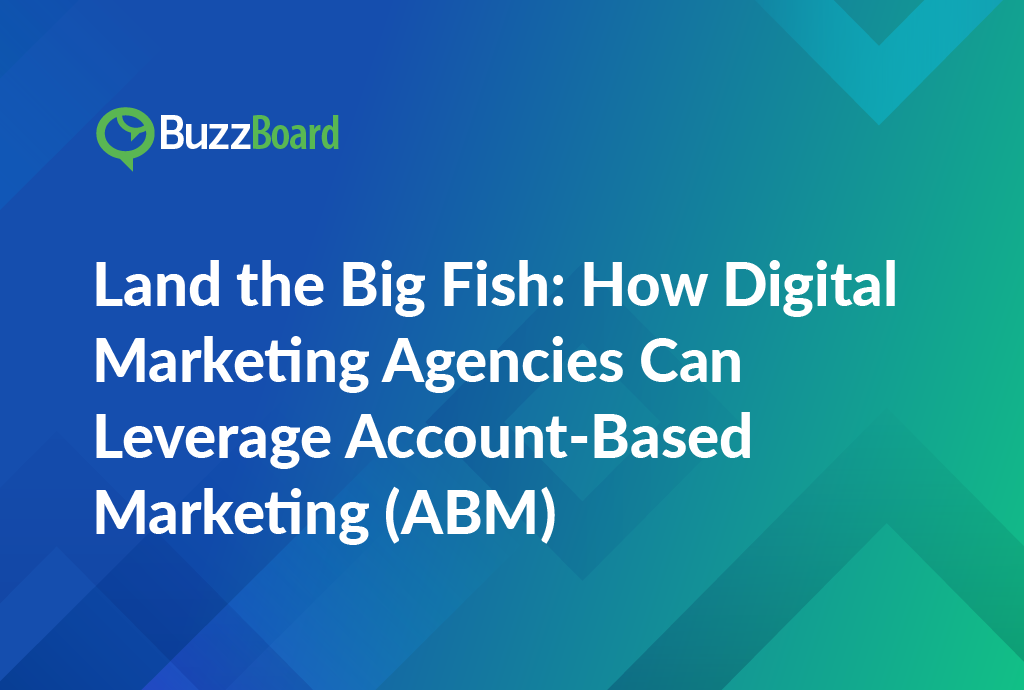Introduction to Account-Based Marketing (ABM) for Digital Marketing Agencies
Digital marketing agencies aiming to streamline their sales efforts should consider implementing account-based marketing (ABM). This strategic client-targeting approach revolves around crafting personalized marketing strategies for each target account, rather than casting a wide net.
ABM pivots on the concept of relationship marketing, which involves creating and nurturing long-term relationships with clients. The adoption of ABM also promotes sales and marketing alignment within agencies, eliminating communication gaps and aligning goals to maximize results. This brings both improved client relationships and higher revenue.
For a digital marketing agency, understanding that ABM is primarily a B2B marketing strategy is vital. In the realm of ABM, the target audience narrows down to specific accounts, which can streamline the marketing process and increase the potential for conversions. To master ABM, one needs to grasp all aspects of the client’s business, including its competitors and the overall industry outlook.
As ABM becomes a cornerstone of mainstream B2B marketing, understanding its intricacies can give you an edge in the industry.
How Strategic Client Targeting Plays a Role in ABM
In today’s competitive digital marketing environment, account-based marketing is an essential tool that agencies use to generate exceptional results. The effectiveness of this B2B marketing strategy hinges on its fundamental principle of strategic client targeting.
Strategic client targeting in ABM involves customizing campaigns to attract and retain high-value clients, particularly focusing on individual customers or firms that align with your company’s objectives. This targeted approach allows your agency to quickly identify the most promising clients and allocate resources effectively.
Personalization is the cornerstone of ABM. It transcends traditional demographics-based targeting. By integrating digital intelligence and behavioral data, agencies can craft personalized experiences for their clients. This not only enhances client satisfaction but also increases opportunities for upselling and maximizing profits.
Strategic client targeting in ABM promotes alignment between sales and marketing teams. With clearly defined objectives and a mutual understanding of the target audience, these departments can develop a unified communication strategy. This unity can enhance effectiveness, minimize marketing waste, and produce a greater return on investment.
Utilizing ABM also paves the way to establish prolonged, meaningful relationships with clients. Relationship marketing bolsters a client’s lifetime value, fostering trust and loyalty.
Leaders in the industry must harness the power of ABM and fully utilize all it offers to their agency. It could be the game-changing strategy your agency needs.
The Importance of Personalized Marketing for Agencies in ABM
ABM plays a crucial role in propelling the success of campaigns for digital marketing agencies. It allows sales teams to concentrate their marketing efforts on key accounts, providing a strategic approach to client targeting. Furthermore, personalizing this strategy in the B2B marketing landscape can yield outstanding results.
Personalized marketing for agencies combines the smart mixing of data-driven ABM with relationship marketing techniques. This combination permits agencies to construct and deliver tailored messages to their clients according to their unique needs and preferences. The outcome? Not just increased interaction and engagement but also a higher conversion rate.
When ABM is paired with personalized marketing, it offers rewarding benefits, like increased ROI, stronger sales, and marketing alignment, improved client relationships, and a better understanding of client profiles. This priceless combination enables agencies’ sales staff to effectively and efficiently approach the decision-makers of small, local businesses.
At the heart of this process and the execution of B2B marketing strategies is equipping your sales team with the required tools and skills. A well-planned ABM program that includes personalized marketing not only fosters a more harmonious relationship between sales and marketing but also optimizes agency campaign profitability.
Aligning Sales & Marketing to Enhance ABM Strategies
Digital marketing agency salespeople recognize the importance of account-based marketing strategies for winning strategic clients. ABM allows for a personalized marketing approach. While ABM isn’t a new concept, achieving maximal effectiveness requires solid alignment between sales and marketing.
Commonly with ABM, sales and marketing teams often operate in silos, resulting in wasted resources and energy. These organizational silos can deter you from meeting your strategic client-targeting goals.
Harmonizing sales and marketing improves communication and promotes relationship marketing. This makes it easier to retain existing clients and attract new ones. Together, these teams merge insights, creativity, and strategy into a solid ABM program. This allows for the crafting of B2B marketing tactics tailored to specific accounts, increasing the efficiency and specificity of results.
Integrating ABM practices into your daily operations, and using tools that aid in aligning sales and marketing efforts, can lead to increased company efficiency and profitability.
Remember, a well-aligned sales and marketing team lays the groundwork for successful ABM strategies, propelling your agency forward in the competitive marketplace.
Understanding the Role of Relationship Marketing in ABM
The merger of relationship marketing with ABM fosters strategic client targeting and personalized marketing for agencies. Relationship marketing bolsters the harmony between sales and marketing within an ABM framework.
ABM is a B2B marketing strategy focused on personalization and nurturing robust relationships with clients. However, many agencies overlook this vital component and merely scratch the surface of customization.
A study reveals that successful ABM leans heavily on the intensity and depth of relationships between agencies and clients. This implies going beyond mere strategic client targeting. It requires agencies to invest in relationship-building activities, like personalized marketing.
At its core, relationship marketing emphasizes customer retention and satisfaction over solely acquiring new customers. Enhanced customer satisfaction leads to stronger customer relationships and, subsequently, an efficient ABM strategy.
Acknowledging this, digital marketing agencies should regard relationship marketing as an essential aspect of their ABM and B2B marketing strategies, tailoring their approach to achieve comprehensive sales and marketing alignment.








